June marked the 25th Anniversary of Gramercy! Thank you to our valued investors, trusted business partners and team members without whom this milestone could not have been reached. We are excited for the opportunities we see ahead, and look forward to continuing to deliver upon our mission to have a positive impact on the well-being of our clients, portfolio investments (and their communities) and our team members.
Contents
Market Overview
Macro Review
Geopolitical conflict usually gives way to stagflation. The second aspect was Chair Powell noting that the Fed was “proceeding carefully” and that conditions had tightened significantly. He went one step further, highlighting that there was “evidence of persistently above-trend growth” and that existing policy was not “too restrictive”. This encouraged a bull steepening moment in U.S. Treasuries as the 30-year note rose 12bps and the 2-year note rallied 6bps. This gave way to the sharpest 2s10s steepening since the March banking stress. Most U.S. Treasury tenors rose above 5.0% this week. With the exception of the 10-year note, broader softness in global equities was a notable theme and the VIX traded above 20, just as oil and gold advanced 3% over the week. Meanwhile, the PBoC are on a different course having ramped up cash injections, but they did keep the MLF rate unchanged at 2.50%, along with the 1-year and 5-year Loan Prime Rates. The overwhelming takeaway is that monetary policy is yet to lift sentiment as supply remains large and policy responses have been meek. Country Garden’s default is another example of that. However, Chinese data through September and October has been more upbeat and the IMF only cut GDP to 5.0% from 5.2% with 2024 GDP forecast to land at 4.2%. Elsewhere, the Bank of Japan announced that it would intervene in the domestic bond market once again, U.K. CPI remained steady at 6.7% as disinflationary trends were notably absent, and U.S. data remains strong. U.S. retail sales were so strong in September (0.7%) that even August was revised higher. The conflict in Israel remains the U.S. is still without a House speaker and the President is looking to socialize significant aid to both Israel and Ukraine. The ECB’s Stournaras remarked that the Middle East turmoil shifted the balance against any further tightening as “we are in the dark” where “it is better to keep all of our options open”. Indeed, Iran suggested an oil embargo on Israel, serving as a reminder of the 1973 oil embargo, which was 50 years ago this week. Poland’s pro-European party ended eight years of populist governing after tense elections, although we are yet to see the full stripes of the coalition as developments remain fluid. Nigeria quietly devalued its naira with the NAFEX rate some 6% over the week. Ecuador’s Daniel Noboa pipped Rafael Correa with 52% of votes and will become Ecuador’s new President. However, the most striking headlines saw OFAC dial-back sanctions on Venezuela by allowing formerly banned opposition candidates to run in the 2024 election. This freed up the trading of Venezuelan and PDVSA bonds, which rallied materially. Ghana’s Ministry of Finance also began pushing for a higher haircut in the latest round of restructuring talks, in the order of 30-40%. Sri Lanka pushed back on a bondholder committee advancing the idea of a macro-linked bond that is tied to contingent on dollar GDP in 2026 and 2027 with coupons that would step-up and step-down. This is a clever idea and a more symmetrical approach to Ukraine’s GDP warrants. The onus is now on the Paris Club and the Official Creditor Committee to speed up talks with the Sri Lankan government. Meanwhile, Guatemala’s President-elect Arevalo from the Seed Movement Party temporarily suspended the political transition after recent protests. The center-left candidate won by a landslide (almost 60%) in a fairly peaceful election as a result of civil unrest. Finally, the S&P revised Chile’s outlook to negative on weaker political consensus.
EM Credit Update
Emerging market sovereign credit (cash bonds) ended the week down 1.6% with credit spreads 3bps tighter. Sovereign outperformers were Venezuela, Sri Lanka and Argentina, while Zambia, Ghana and Ukraine underperformed. In surprising fashion, Saudi Arabia’s Public Investment Fund were in the market issuing $3.5bn on top of the $8.5bn of Eurobond debt already outstanding. The entity has a controlling AUM of $714bn, with $28bn in cash and a further $34bn in treasury assets, against $25.5bn in debt. Issuance of this nature was perceived as a show of strength and a clear sign that there is value in Middle Eastern investment grade bonds.
The Week Ahead
The U.S. Federal Reserve is now in “blackout”. Instead, the focus shifts to U.S. data with 3Q GDP growth and the question of whether it re-accelerated with consumer support, net exports and higher inventories. The ECB is then likely to pause its monetary tightening given softer inflation releases in September, but there will be equal focus on understanding macroeconomic assumptions prior to the official release in December (similar to the Fed’s Summary of Economic Projections). In addition to interest rate decisions from the ECB and Bank of Canada, we can expect updates from Chile (9.5%), Hungary (13%), Israel (4.75%) and Turkey (30%). The main development out of Asia rests with industrial production which is likely to show some positive seasonality in Singapore and Taiwan. Finally, Argentina heads to the polls this weekend. Libertarian Javier Milei looks to be in the lead, followed by Peronist economy minister Sergio Massa and conservative Patricia Bullrich. The top candidate needs at least 45% of the vote outright or 40% with a 10pt advantage on October 22 to avoid a runoff. Should there be a need for a run-off, this will take place on November 19th.
Highlights from emerging markets discussed below: Resumption of talks between the Maduro government and opposition catalyzes significant U.S. sanctions relief for Venezuela, For a second time after 2021, Ecuador voters reject Corresimo’s attempt to return to power and Javier Milei enters the first round of pivotal Argentina elections on Sunday as the favorite.
Fixed Income
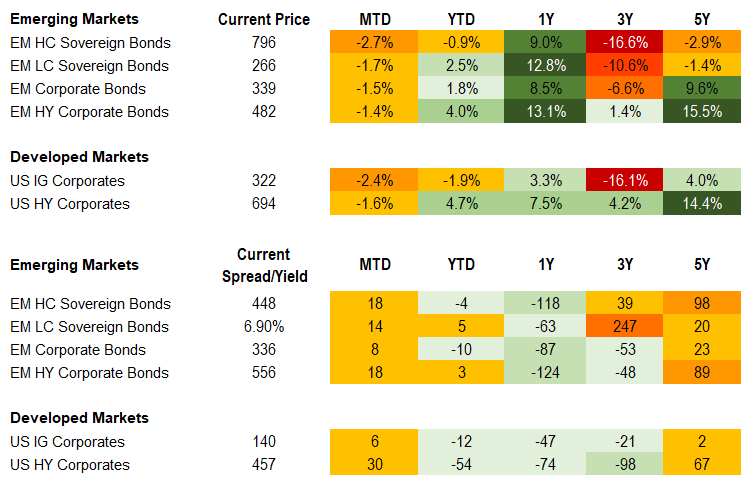
Equities
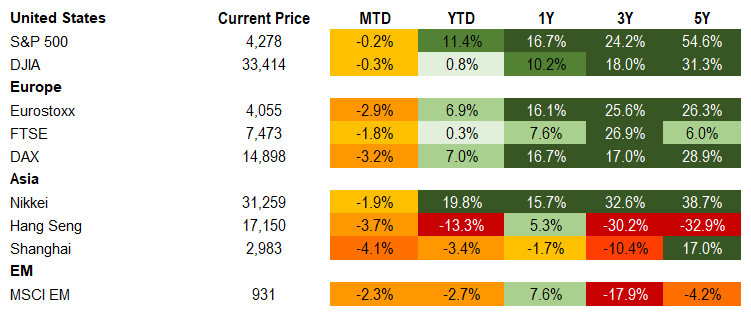
Commodities

Source for data tables: Bloomberg, JPMorgan, Gramercy. EM Fixed Income is represented by the following JPMorgan Indicies: EMBI Global, GBI-EM Global Diversified, CEMBI Broad Diversified and CEMBI Broad High Yield. DM Fixed Income is represented by the JPMorgan JULI Total Return Index and Domestic High Yield Index. Fixed Income, Equity and Commodity data is as of October 20, 2023 (mid-afternoon).
Emerging Markets Weekly Highlights
Resumption of talks between the Maduro government and opposition catalyzes significant U.S. sanctions relief for Venezuela
Event: Following months of “behind the scenes” diplomatic efforts, representatives of Venezuela’s opposition and the Maduro regime came back to the Norway-mediated negotiation table. The two sides traveled to Barbados this week and reached agreements related to ensuring certain political conditions ahead of the 2024 Presidential Elections. These developments were followed by a major easing of the U.S. sanctions regime on Venezuela, including on the oil industry and secondary market trading of sovereign debt.
Gramercy commentary: Following the announcement that the government and opposition have resumed political discussions ahead of the planned 2024 general elections, the Biden Administration announced a broad license temporarily authorizing transactions in Venezuela’s oil and gas sector and removing the secondary trading ban on Venezuelan sovereign and PDVSA debt. This was a material upside surprise relative to market expectations in terms of the initial phase of sanctions relief that the U.S. Administration was prepared to offer, sparking a significant market rally in the now sanctions-free secondary bond market. The U.S. license authorizes all transactions related to the production, lifting, sale, and exportation of oil and gas from Venezuela, as well as the provision of services. According to initial estimates, this could lead to around 150-200k b/d of additional oil production over the next year and is clearly a credit-positive development for the country that derives FX revenues almost exclusively from its oil industry. As far as sovereign debt restructuring is concerned, it remains off the table for now given that primary debt sanctions remain in place. However, the significant developments of the last week after years of lack of progress on the Venezuela situation signal that there is momentum for a continued political thaw in the U.S.-Venezuela relationship. Further steps in providing sanctions relief will likely be conditioned on successful implementation of the Barbados agreements as well as provision of further guarantees by the authorities in Caracas for “free and fair” elections in 2024. The next possible signposts on this could include how the Maduro Administration will manage the situation around the leading opposition candidate Maria Corina Machado, who is currently formally banned from participating in politics. The opposition’s primary elections to select its presidential candidate for the 2024 elections are scheduled to take place on Sunday and Ms. Machado has made it clear that she intends to participate, despite being barred from holding office. The outcome of the primaries, including the support that the opposition gets and the regime’s reaction to it, will be major factors influencing the international community’s approach and momentum toward continued sanctions relief by the U.S. Administration.
For a second time after 2021, Ecuador voters reject Corresimo’s attempt to return to power
Event: With 52% vs. 48%, Daniel Noboa, the 35-year-old heir to one of Ecuador’s wealthiest business dynasties and newcomer to the political arena, defeated Luisa Gonzalez in the runoff of snap Presidential Elections last Sunday. Gonzalez was hand-picked by exiled former President Rafael Correa in an attempt to regain the presidency for his left-wing populist movement after losing against financier Guillermo Lasso in the 2021 elections.
Gramercy commentary: From a market perspective, the main risks stemming from Ecuador’s snap Presidential Elections was a sharp populist shift in economic policy as well as possible constitutional changes aimed at paving the way for Rafael Correa’s return to the country. Both credit-negative scenarios have now been put on the backburner until the next (regular) Presidential Elections in 2025. While the election results provide a welcome relief for investors, Ecuador continues to face significant challenges, mainly in terms of general economic and security conditions. Daniel Noboa, the youngest person to be elected President in Ecuador’s history, rode a wave of wide-spread discontent with the traditional political establishment in the country in the context of sharp deterioration in the country’s domestic security environment. As such, improvements in terms of fighting rampant organized crime and securing fresh sources of USD liquidity in the near-term will be the two top priorities in the early days of Noboa’s Presidency. He is facing a challenging political landscape in the National Assembly and a short 18-month period until the next elections, which is unlikely to be conducive for significant reforms. Nevertheless, we think that Ecuador’s sovereign bond complex remains undervalued relative to the election outcome and the avoidance of the worst-case scenario of Correismo’s pre-mature return to power. The market will likely focus next on Noboa’s key policymaker appointments and his messages on economic policy. Constructive cabinet appointments in the key economic and domestic security policy positions could catalyze further repricing for the sovereign bonds following the initial relief rally on the news of Noboa’s win.
Javier Milei enters the first round of pivotal Argentina elections on Sunday as the favorite
Event: The first round of Argentina’s Presidential Election will take place on Sunday with a potential runoff between the two leading candidates scheduled for November 19th. Javier Milei, a libertarian anti-establishment candidate whose ideas on economic policy are considered radical by some observers, enters the race as the favorite, having delivered significant outperformance (30% support vs. polls <20%) in the August Primary Elections. Right-leaning Patricia Bullrich from the opposition JxC and current Finance Minister Sergio Massa from the left-wing ruling coalition are engaged in a severe battle for second place and a spot in a potential runoff in November.
Gramercy commentary: Amid a very challenging macroeconomic environment, rampant inflation and dwindling living standards, Javier Milei, a political outsider with some radical economic policy ideas, appears to be in a great position to capitalize on voters’ discontent. Polls in Argentina tend to be unreliable, but an outright Milei victory in the first round on Sunday seems to be in the realm of possibility, albeit unlikely. The most likely scenario appears to be a second round run off in November between Milei and Massa, which according to most political experts in Argentina, should be an easy one for Mr. Milei to win given Mr. Massa’s association with the current economic environment and potential coalition-building scenarios between the first and second round that are expected to favor Milei. If market-friendly candidate Patrica Bullrich makes it to the second round, the runoff is likely to be far more competitive and likely to be seen as the most constructive outcome for the Argentine sovereign bond complex. On the flip side, an outright Milei victory on Sunday could be interpreted by investors as the most disruptive scenario, given that it would likely catalyze a long period of potential significant economic volatility during the coexistence of the weak outgoing Administration and a firebrand incoming President on a mission to dismantle traditional economic institutions. Some of Milei’s main proposals on economic policy, such as abolishing the Central Bank and dollarizing the economy, are shrouded in uncertainty around implementation challenges amid lack of congressional support for Milei and possible social and economic repercussions. From that perspective, the distribution of seats in congress after Sunday’s legislative elections will also be a key signpost for markets as the implementation of Milei’s economic agenda, in the event he becomes Argentina’s next president, will hinge heavily on his ability to construct legislative support.
Emerging Markets Technicals
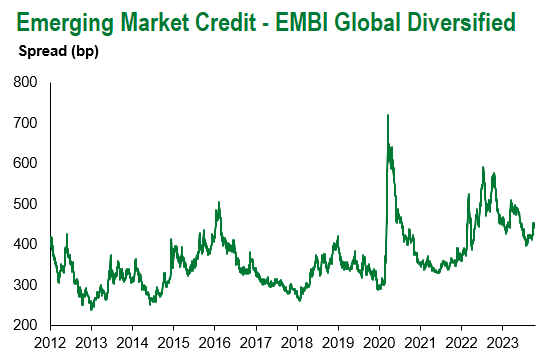
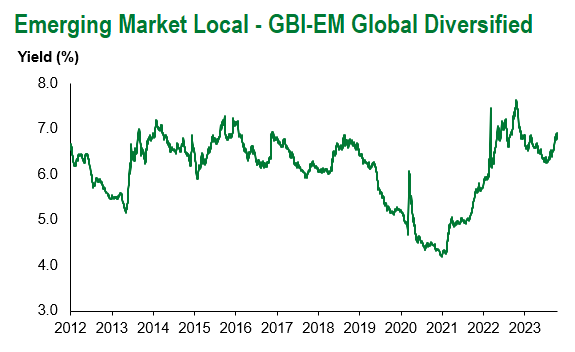
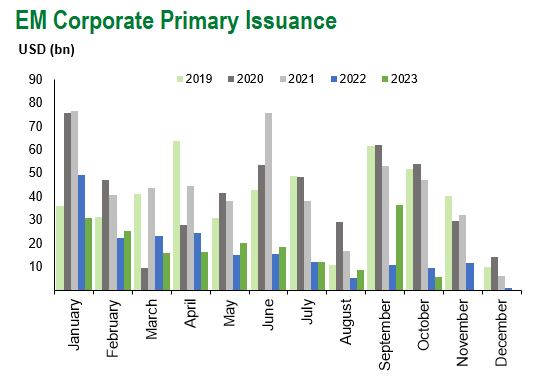
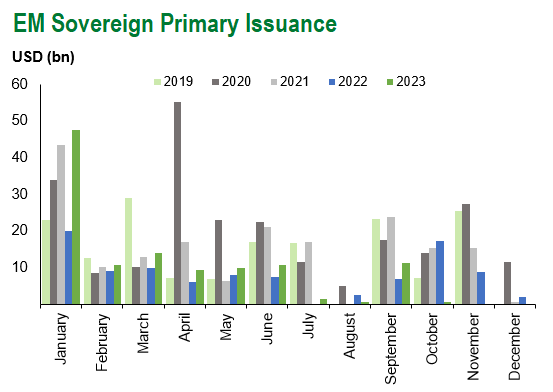
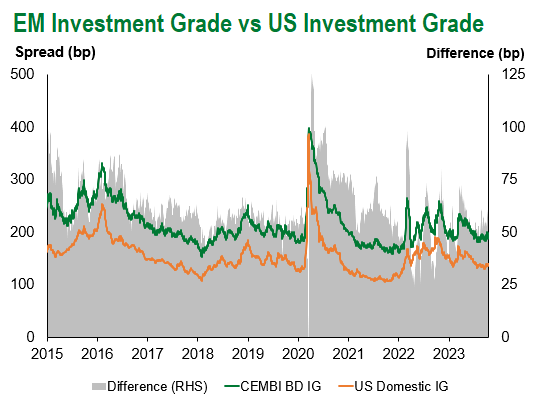
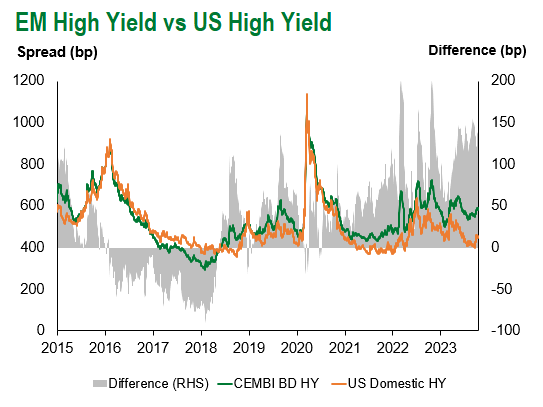
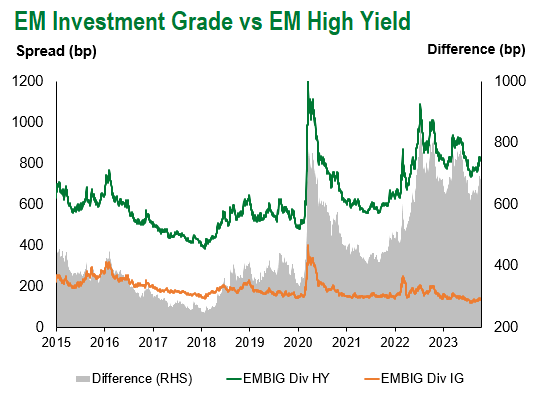
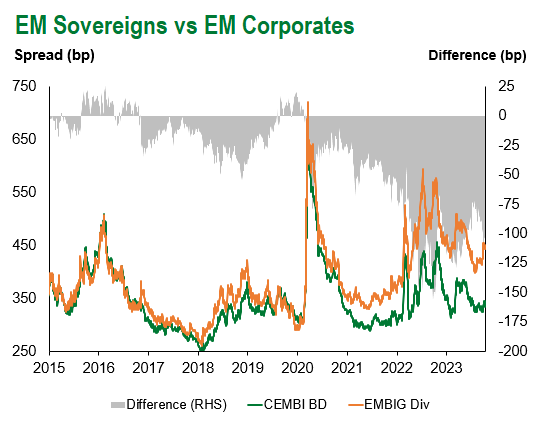
Emerging Markets Flows
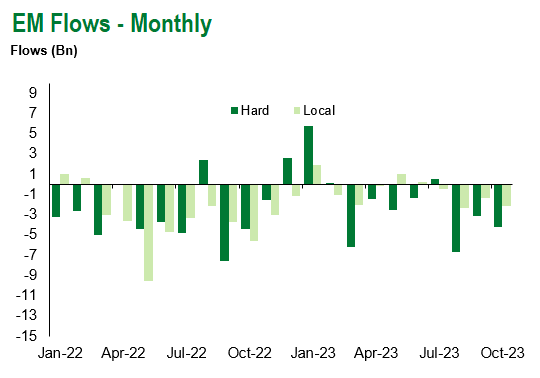
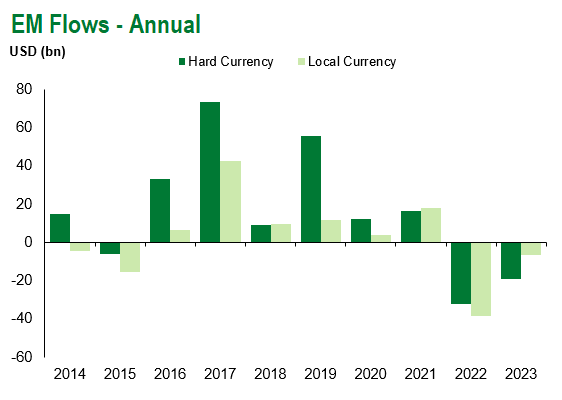
Source for graphs: Bloomberg, JPMorgan, Gramercy. As of October 20, 2023.
For questions, please contact:
Kathryn Exum, CFA ESG, Director, Co-Head of Sovereign Research, [email protected]
Petar Atanasov, Director, Co-Head of Sovereign Research, [email protected]
James Barry, Director, Deputy Portfolio Manager, [email protected]
This document is for informational purposes only. The information presented is not intended to be relied upon as a forecast, research or investment advice, and is not a recommendation, offer or solicitation to buy or sell any securities or to adopt any investment strategy. Gramercy may have current investment positions in the securities or sovereigns mentioned above. The information and opinions contained in this paper are as of the date of initial publication, derived from proprietary and nonproprietary sources deemed by Gramercy to be reliable, are not necessarily all-inclusive and are not guaranteed as to accuracy. This paper may contain “forward-looking” information that is not purely historical in nature. Such information may include, among other things, projections and forecasts. There is no guarantee that any forecasts made will come to pass. Reliance upon information in this paper is at the sole discretion of the reader. You should not rely on this presentation as the basis upon which to make an investment decision. Investment involves risk. There can be no assurance that investment objectives will be achieved. Investors must be prepared to bear the risk of a total loss of their investment. These risks are often heightened for investments in emerging/developing markets or smaller capital markets. International investing involves risks, including risks related to foreign currency, limited liquidity, less government regulation, and the possibility of substantial volatility due to adverse political, economic or other developments. References to any indices are for informational and general comparative purposes only. The performance data of various indices mentioned in this update are updated and released on a periodic basis before finalization. The performance data of various indices presented herein was current as of the date of the presentation. Please refer to data returns of the separate indices if you desire additional or updated information. Indices are unmanaged, and their performance results do not reflect the impact of fees, expenses, or taxes that may be incurred through an investment with Gramercy. Returns for indices assume dividend reinvestment. An investment cannot be made directly in an index. Accordingly, comparing results shown to those of such indices may be of limited use. The information provided herein is neither tax nor legal advice. Investors should speak to their tax professional for specific information regarding their tax situation.
